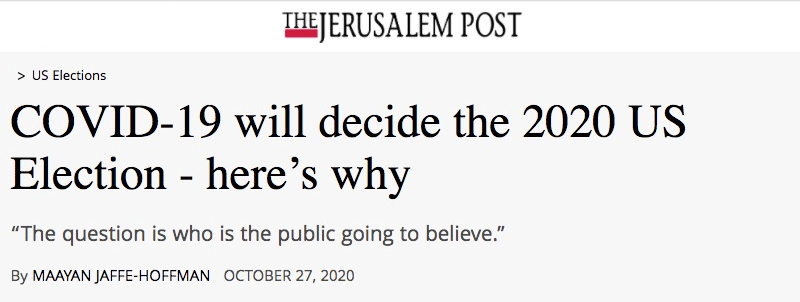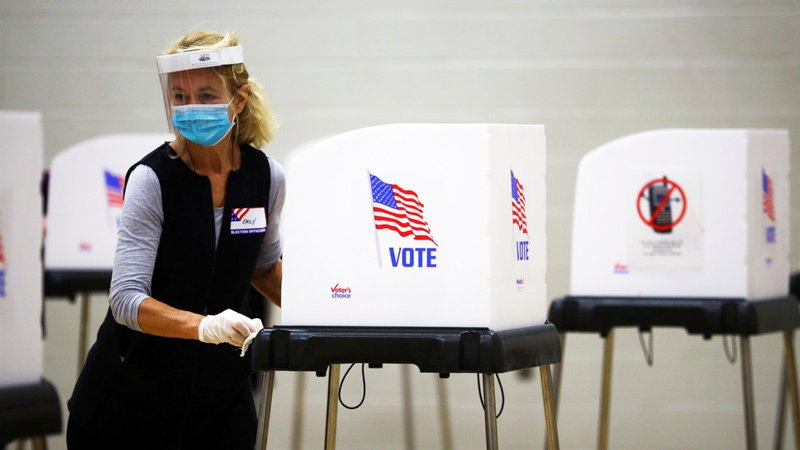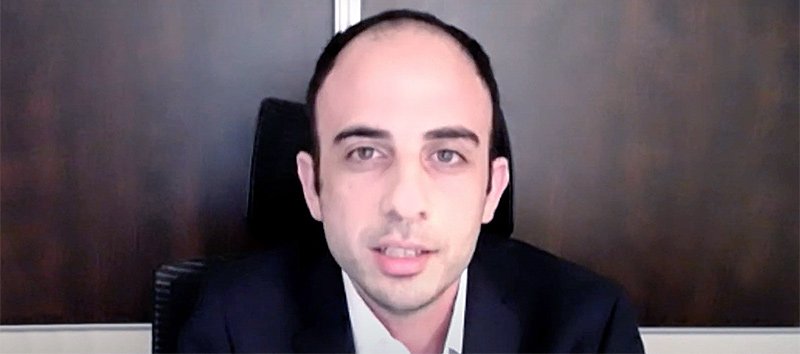Editor’s note: Dr. Yonatan Freeman, an international relations and media expert who teaches in the Department of Political Science at Hebrew University, analyzes the US election in terms of the coronavirus response.


The 2020 US presidential election, like many of this year’s most important decisions, will be decided by COVID-19.
Just as the coronavirus has spread across America, it has seeped into the political campaigns of US President Donald Trump and Democratic candidate Joe Biden.
On the one hand, the Democrats argue that Trump has failed in his handling of the crisis. As of Tuesday, some 226,000 Americans have died of COVID-19 out of 8.78 million who have been infected.
On the other hand, the president says that he did very well, all things considered, and if Biden would have been in charge, the death rate would have been two million or more.
The Democrats say that Trump and his staff contracted coronavirus because of their failure to comply with health officials’ recommendations, such as wearing masks and social distancing. The president will argue he caught coronavirus and survived: that he won his personal battle against the pandemic.
“The question is who the public is going to believe,” said Prof. Eytan Gilboa, a senior research associate at the Begin-Sadat Center for Strategic Studies at Bar-Ilan University. “The Democrats want the election to be about coronavirus; Trump is trying to deflect from the subject.”
Despite the fact that cases are in fact highest now in districts the president generally leads and needs, it is not clear that COVID will plague the president in the final days of his campaign as much as some might think.
The White House appears unable to stop the spread of the virus, as numbers spike at once-again unprecedented rates. And this is especially the case for Biden’s constituencies: Minority groups, including Latinos and African-Americans, have been harder hit by the pandemic than other groups.
A paper published on the website of USC Dornsife College of Letters, Arts and Sciences showed that hospitalizations and deaths from COVID-19 among members of the African-American community are nearly three times their share in the general population.
The paper also highlighted that Latinos were among the hardest hit economically. A Pew Research Center report found that in April, almost half (49%) of Latinos — compared to 33% of all US adults — said they or someone in their household had taken a pay cut, lost a job or both because of the pandemic.
“This could lead to more support for Joe Biden,” Gilboa contended. “Biden could use this as a way to increase voting by those groups for him.”
However, historically in times of national emergencies, Americans rally around the flag and tend to cling to the incumbent for support, Gilboa said. Former US President George Bush’s ratings rose rapidly after 9/11, for example, and likely played into his re-election in 2004.
Many people have framed the fight against the pandemic as a modern world war. If Americans see it that way, they could turn toward Trump.
Furthermore, Trump is seen by some as fighting for liberty and personal choice, explained Dr. Yonatan Freeman, an international relations and media expert who teaches in the Department of Political Science at Hebrew University. He said that Trump’s refusal to impose nationwide mandates to wear masks or social distancing is seen by some as ensuring the people’s right to choose.

Americans’ view of China and its role in the pandemic could also lead to a Trump win. Most recent polls show that US public opinion is down on China and declining.
“If China is seen as the foreign power or adversary responsible for what is going on in America, that could potentially increase support for Donald Trump,” Freeman said, noting that while both Biden and Trump are seen as critical of China, Trump is seen as even more critical and the stronger candidate to keep the enemy country at bay.
The economic ramifications of the coronavirus will be a big issue in this election, too. However, Freeman said that if people blame China for the economic situation – claiming that China is responsible for the virus – then they would not blame Trump. And while most surveys show the people trust Biden more to secure their health, they believe Trump is better equipped to handle the nation’s economy.
A Yahoo News / YouGov poll published earlier this month showed that 48% of likely voters think Biden would better handle the coronavirus pandemic, compared to 39% for Trump. But 46% said Trump would better handle the economy, compared to 41% for Biden.
There is one final and very practical way that the coronavirus will impact the US election – and that is the mail-in ballot system.
Already, more than 60 million Americans have voted with mail-in ballots, which is likely to lead to record-breaking turnout. According to Gilboa, not since 1908 have more than 65% of eligible US voters actually exercised their right to vote. In 2016, only 55% of eligible voters cast their ballots.
Gilboa said that mail-in ballots could favor the Democrats because there are more Democrats in the US than Republicans and because the people voting by mail-in ballots are those that consider coronavirus a threat and therefore want to avoid going to the polls.
Likewise, he said, those who are over 65 are also more likely to vote by mail – and for the Democratic candidate – because this population has been hardest hit by the pandemic.
Both men have accumulated a towering record of reasons for voters to like or dislike them. In the end, however, their fate hangs not on their campaigns, but on COVID-19 – a disease and a factor that they cannot control.